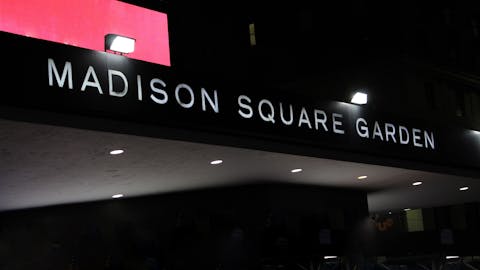David Hopkinson : Great. Thanks Ben. I’ll tackle the first half of that and then I’ll let Victoria answer the second part of your question. The short answer is, no. We’re just not seeing an impact on our business other than a really strong demand for the product. Look, like you we’re really mindful of the broader macro environment, but if I look across, sort of three big sectors of our business, all of them are really strong. Ticketing, as I mentioned, we had season ticket rules that exceeded 90%, strong sales for both teams strong demand for new packages, strong group, and individual ticket sales. As I mentioned in my remarks, the group individual ticket sales exceeded last year’s Q2, but they were also above the pre-pandemic Q2 in 2020.
So, tickets on an individual basis look better than ever. Specifically, with respect to corporate demand, our business remains strong and if I think about sponsorships, we’re seeing, as I mentioned, the full run rate of mobile sports gaming with our three partners in their first full-year with us. We see great demands for new offerings in the marketplace, the NHL introduced the digitally enhanced DasherBoards this year. We’re seeing great demand from €“ on that inventory from our partners. And have introduced the new partners, the renewals and with Spectrum, Verizon, Dunkin’, Jägermeister, a new deal in Hub. So, we’re seeing strong demand from the corporate sector. And we think we’ve got opportunity for headroom as well with both international as an opportunity for the mix and patch partners yet to come for both Knicks and Rangers.
With respect to the suites and premium products, we had a great year for renewals. We’re having a great year for new sales. And in conclusion, yes, we’re taking none of that for granted. We’re working hard every day. We follow the economy like you do, but so far we’re seeing absolutely no softening whatsoever, and in fact, really robust demand.
Ben Swinburne: Great.
David Hopkinson: Will take over from there?
Victoria Mink : Sure. So, yes, we have not publicly provided an official will target. But I will say it is certainly something that we’re thinking about and that we are discussing internally, right. And you’re correct, the leagues do have oversight as to the amount of debt that either one of the teams could carry, but sort of as we mentioned, we’re going to feel very good about our overall liquidity position, the amount of debt that we currently have outstanding. Again, we just think it’s prudent to use our excess cash flow at this time. So, to just continue to pay it down given the overall cost of borrowing these days, but like I said, it is certainly something that we spend a lot of time thinking about. But at the end of the day, when I really take that step back, it’s really the trajectory of the business that we feel good about and our ability to generate free cash flow and then it’s the potential as to what we can do with that cash going forward.
Again, with some variety of capital allocation and opportunities that are out there, including returning money to shareholders as we did that we were very pleased to be able to do.
Ben Swinburne: Great. Thank you. Your next question comes from the line of Devin Brisco from Wolfe Research. Your line is open.
Devin Brisco: Thanks. My question is related to the upcoming NBA National TV rights renewal. The values that are being talked about are multiples higher than the current deal. Could you talk about how strong the flow through of incremental revenue to cash flow could be from a new deal? And if and how it would change your capital allocation priorities?
Victoria Mink: Sure, Devin. So, first-off, right, we continue to believe in the value of live sports and particularly as well as our leagues appeal domestically and internationally. And we fully trust the NBA to maximize the opportunity when the time comes, which €“ so just as a reminder, that’s going to be after the 2024, 2025 season, which is where the current agreement runs through. So, sort of what we’re talking about would be out into our fiscal 2026. But specifically to answer your question, in terms of that financial impact, all teams across the league, which share equally in the increase from national media fees with a net impact of, I would say, roughly about half before revenue sharing dropping down to increase our AOI.
So, certainly some good potential for a positive financial impact. And when I talked about the capital allocation policy, a little earlier, we sort of focused a bit more on the near term in terms of the potential for excess cash flow on €“ with play-offs. But I think thinking out several years, I think the priorities still remain the same in terms of maintaining a healthy balance sheet, maintaining enough liquidity for our ongoing operating needs, and then again, from a longer-term perspective, which is, I think is what we’re talking about here is that opportunity for additional returns of capital.
Devin Brisco: Thank you.
Operator: And your next question comes from the line of Paul Golding from Macquarie Capital. Your line is open.
Paul Golding: Thanks so much. I was hoping we could dive a little deeper into some of the comments earlier around the sponsorship space. In terms of cohort, is there any color you could give? It’s apparent that the mobile sports betting cohort seemingly media as well has been strong, but are they, sort of mopping up any excess supplier inventory, sort of in the spot market from others that might be weaker or is it pretty much all spoken for in terms of the strength that they’re able to deliver as the largest component of your sponsorship revenue? And then secondly, just wanted to see if we could get a little more color on the jersey patch sponsorship process? Thanks so much.




